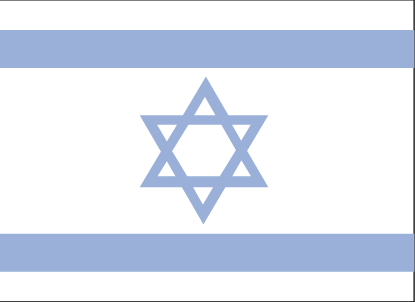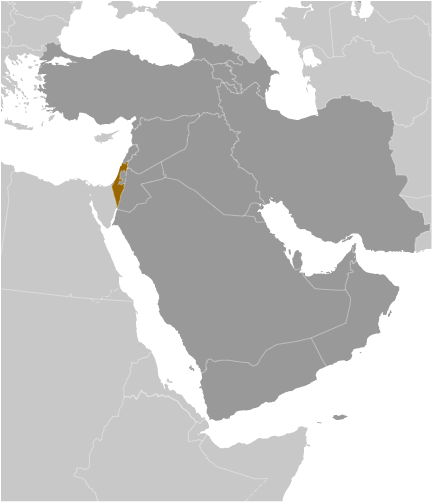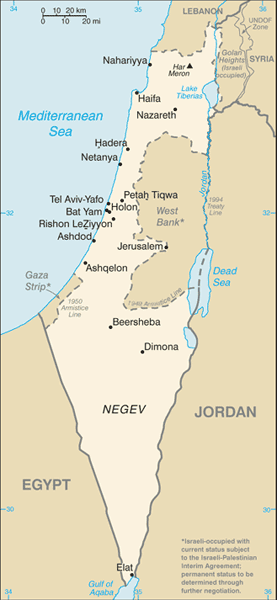Following World War II, the British withdrew from their mandate of Palestine, and the UN partitioned the area into Arab and Jewish states, an arrangement rejected by the Arabs. Subsequently, the Israelis defeated the Arabs in a series of wars without ending the deep tensions between the two sides. The territories Israel occupied since the 1967 war are not included in the Israel country profile, unless otherwise noted. On 25 April 1982, Israel withdrew from the Sinai pursuant to the 1979 Israel-Egypt Peace Treaty. In keeping with the framework established at the Madrid Conference in October 1991, bilateral negotiations were conducted between Israel and Palestinian representatives and Syria to achieve a permanent settlement. Israel and Palestinian officials signed on 13 September 1993 a Declaration of Principles (also known as the "Oslo Accords") guiding an interim period of Palestinian self-rule. Outstanding territorial and other disputes with Jordan were resolved in the 26 October 1994 Israel-Jordan Treaty of Peace. In addition, on 25 May 2000, Israel withdrew unilaterally from southern Lebanon, which it had occupied since 1982. In April 2003, US President BUSH, working in conjunction with the EU, UN, and Russia - the "Quartet" - took the lead in laying out a roadmap to a final settlement of the conflict by 2005, based on reciprocal steps by the two parties leading to two states, Israel and a democratic Palestine. However, progress toward a permanent status agreement was undermined by Israeli-Palestinian violence between September 2003 and February 2005. In the summer of 2005, Israel unilaterally disengaged from the Gaza Strip, evacuating settlers and its military while retaining control over most points of entry into the Gaza Strip. The election of HAMAS to head the Palestinian Legislative Council froze relations between Israel and the Palestinian Authority (PA). Ehud OLMERT became prime minister in March 2006 and presided over a 34-day conflict with Hizballah in Lebanon in June-August 2006 and a 23-day conflict with HAMAS in the Gaza Strip during December 2008 and January 2009. OLMERT, who in June 2007 resumed talks with PA President Mahmoud ABBAS, resigned in September 2008. Prime Minister Binyamin NETANYAHU formed a coalition in March 2009 following a February 2009 general election. Peace talks are currently stalled.
Country Name
Conventional long form:State of Israel
Conventional short form:Israel
Local long form:Medinat Yisra'el
Local short form: Yisra'el
Government Type
parliamentary democracy
Capital
Name:Jerusalem
Geographic coordinates:31 46 N, 35 14 E
Time difference:UTC+2 (7 hours ahead of Washington, DC during Standard Time)
daylight saving time: +1hr, begins last Friday in March; ends the Sunday between the holidays of Rosh Hashana and Yom Kippur
note: Israel proclaimed Jerusalem as its capital in 1950, but the US, like all other countries, maintains its Embassy in Tel Aviv
Administrative divisions
6 districts (mehozot, singular - mehoz); Central, Haifa, Jerusalem, Northern, Southern, Tel Aviv
Independence
14 May 1948 (from League of Nations mandate under British administration)
National Holiday
Independence Day, 14 May (1948); note - Israel declared independence on 14 May 1948, but the Jewish calendar is lunar and the holiday may occur in April or May
Constitution
no formal constitution; some of the functions of a constitution are filled by the Declaration of Establishment (1948), the Basic Laws of the parliament (Knesset), and the Israeli citizenship law; note - since May 2003 the Constitution, Law, and Justice Committee of the Knesset has been working on a draft constitution
Legal system
mixture of English common law, British Mandate regulations, and in personal matters Jewish, Christian, and Muslim legal systems; has not accepted compulsory ICJ jurisdiction
Suffrage
18 years of age; universal
Executive branch
Chief of state:President Shimon PERES (since 15 July 2007)
Head of government:Prime Minister Binyamin NETANYAHU (since 31 March 2009)
Cabinet:Cabinet selected by prime minister and approved by the Knesset
(For more information visit the World Leaders website)
Elections:president largely a ceremonial role and is elected by the Knesset for a seven-year term (one-term limit); election last held 13 June 2007 (next to be held in 2014 but can be called earlier); following legislative elections, the president, in consultation with party leaders, assigns the task of forming a governing coalition to a Knesset member who he or she determines is most likely to accomplish that task
Election results:Shimon PERES elected president; number of votes in first round - Shimon PERES 58, Reuven RIVLIN 37, Colette AVITAL 21; PERES elected president in second round with 86 votes (unopposed)
Legislative branch
unicameral Knesset (120 seats; political parties are elected by popular vote and assigned seats for members on a proportional basis; members serve four-year terms)
Elections:last held on 10 February 2009 (next scheduled election to be held in 2013)
Election results:percent of vote by party - Kadima 23.2%, Likud-Ahi 22.3%, YB 12.1%, Labor 10.2%, SHAS 8.8%, United Torah Judaism 4.5%, United Arab List 3.5%, NU 3.4%, Hadash 3.4%, The Jewish Home 3%, The New Movement-Meretz 3%, Balad 2.6%; seats by party - Kadima 28, Likud-Ahi 27, YB 15, Labor 13, SHAS 11, United Torah Judaism 5, United Arab List 4, NU 4, HADASH 4, The Jewish Home 3, The New Movement-Meretz 3, Balad 3
Judicial branch
Supreme Court (justices appointed by Judicial Selection Committee - made up of all three branches of the government; mandatory retirement age is 70)
Political Parties and Leaders
Balad [Azmi BISHARA]; Democratic Front for Peace and Equality (HADASH) [Muhammad BARAKEH]; Kadima [Tzipora "Tzipi" LIVNI]; Labor Party [Ehud BARAK]; Likud [Binyamin NETANYAHU]; National Union [Yaakov KATZ]; SHAS [Eliyahu YISHAI]; The Jewish Home (HaBayit HaYehudi) [Daniel HERSCHKOWITZ]; The New Movement-Meretz [Haim ORON]; United Arab List-Ta'al [Ibrahim SARSUR]; United Torah Judaism or UTJ [Yaakov LITZMAN]; Yisrael Beiteinu or YB [Avigdor LIEBERMAN]
Political pressure groups and leaders
B'Tselem [Jessica MONTELL, Executive Director] monitors human rights abuses; Peace Now [Yariv OPPENHEIMER, Secretary General] supports territorial concessions in the West Bank and Gaza Strip; YESHA Council of Settlements [Danny DAYAN, Chairman] promotes settler interests and opposes territorial compromise; Breaking the Silence [Yehuda SHAUL, Executive Director] collects testimonies from soldiers who served in the West Bank and Gaza Strip
International organization participation
BIS, BSEC (observer), CERN (observer), CICA, EBRD, FAO, IADB, IAEA, IBRD, ICAO, ICC, ICCt (signatory), ICRM, IDA, IFAD, IFC, IFRCS, ILO, IMF, IMO, IMSO, Interpol, IOC, IOM, IPU, ISO, ITSO, ITU, ITUC, MIGA, OAS (observer), OECD (accession state), OPCW (signatory), OSCE (partner), Paris Club (associate), PCA, SECI (observer), UN, UNCTAD, UNESCO, UNHCR, UNIDO, UNWTO, UPU, WCO, WFTU, WHO, WIPO, WMO, WTO
Diplomatic representation in the US
Chief of mission:Ambassador Michael OREN
Chancery: 3514 International Drive NW, Washington, DC 20008
Telephone:[1] (202) 364-5500
FAX: [1] (202) 364-5607
Consulate(s) general:Atlanta, Boston, Chicago, Houston, Los Angeles, Miami, New York, Philadelphia, San Francisco
Diplomatic representation from the US
Chief of mission:Ambassador James B. CUNNINGHAM
Embassy:71 Hayarkon Street, Tel Aviv 63903
Telephone:[972] (3) 519-7575
FAX: [972] (3) 516-4390
consulate(s) general: Jerusalem; note - an independent US mission, established in 1928, whose members are not accredited to a foreign government
Flag description
white with a blue hexagram (six-pointed linear star) known as the Magen David (Shield of David) centered between two equal horizontal blue bands near the top and bottom edges of the flag; the basic design resembles a Jewish prayer shawl (tallit), which is white with blue stripes; the hexagram as a Jewish symbol dates back to medieval times










